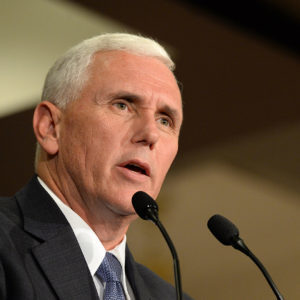For an alternate viewpoint, see “Counterpoint: Honesty Is a Good Thing, and Trump Was Honest With America.”
WASHINGTON — Only in the “Alice in Wonderland” universe that Donald Trump has created since he jolted U.S. politics eight years ago could his former vice president be selling swag featuring a slogan the indicted ex-president intended as the worst slur.
While Trump’s angry “too honest” insult exploded into the news with its inclusion in the most recent indictment of him, Pence first revealed it in November 2021 in his memoirs. Nine months earlier, Pence wrote then, Trump had asked him to support a lawsuit by Republicans claiming that the Constitution gave the vice president sole authority to decide which Electoral College votes to accept in certifying a presidential election. That suit is among 63 election-fraud challenges Trump or his supporters have lost, many in courts with judges he appointed.
Pence responded to Trump’s request: “I told him, as I had many times, that I didn’t believe I possessed that power under the Constitution.”
His accurate assessment prompted Trump to exclaim: “You’re too honest. Hundreds of thousands are gonna hate your guts.”
Trump proved prophetic: Five days after their conversation, more than 2,000 pro-Trump rioters smashed their way into the U.S. Capitol as Congress met in joint session to certify that Joe Biden had won the November 2020 election. Some insurrectionists chanted, “Hang Mike Pence,” sending him fleeing to a hiding place in the twisting catacombs beneath the Capitol.
Pence, now running for president in next year’s elections, recounted Trump’s admonition during five hours of testimony in April before a federal grand jury convened by special counsel Jack Smith, who took the unusual step of sitting in while the former vice president testified under oath. It was highlighted in the 45-page indictment the grand jury handed up on August 1, charging Trump with three counts of conspiracy and one count of obstruction for his efforts to overturn the election outcome.
Now. the Pence campaign sells T-shirts and baseball caps emblazoned with “Too Honest” in big red letters.
While Trump has been ridiculed for his rebuke, seen by legal experts as an admission of guilt, like so many of his outrageous claims, it contains a kernel of truth.
Sometimes, a U.S. president or vice president must not be “too honest.” Our history features dramatic examples of presidential lies, some uttered to safeguard national security. In 1962, President John F. Kennedy’s aides said a bad cold forced him to cancel a campaign tour to conceal his top-secret meetings about the Cuban Missile Crisis, which he had not disclosed to the country. JFK’s predecessor, Dwight Eisenhower, released false statements in 1960 about U.S. spy flights over the Soviet Union after a U.S. pilot, Francis Gary Powers, was shot down by the Russians.
Other presidents lied to avoid embarrassment, as when President Clinton told the nation in 1998 that he “did not have sexual relations with that woman, Miss (Monica) Lewinsky,” a former White House intern.
The lie that Trump pushed Pence to tell was of an entirely different order: He wanted his vice president unilaterally to alter millions of Americans’ votes in a presidential election, an action that was clearly unconstitutional and one that would likely have led to criminal charges against Pence.
That effort by Trump puts him in a small group of presidents who committed crimes or impeachable offenses, sometimes implicating aides. Richard Nixon told reporters at an August 1972 news conference that White House counsel John Dean had led a thorough investigation of the Watergate break-in two months earlier, finding that no one in his administration “was involved in this very bizarre incident.”
That statement contained several lies: There had been no investigation, and multiple Nixon aides, including Dean, had been involved in either planning the break-in or covering it up. Nixon led the cover-up, a role that forced his resignation two years later. After Nixon’s resignation in August 1974, only a pardon by his successor, Gerald Ford, prevented him from becoming the first president or ex-president to face criminal charges, a dishonor held a half-century later by Trump.
The billionaire New Yorker was impeached for helping foment the January 6 insurrection. Now he stands indicted for leading a conspiracy to prevent Congress from certifying his 2020 election defeat and for obstructing efforts to investigate his actions. In typical fashion, Trump is responding to those charges by piling on still more lies, arguing that the whole case represents an effort by Democrats to stop him from becoming president again.
But some of Trump’s opponents are Republicans, and one of them was once his most powerful aide. By turning his former boss’s smear of him into a campaign boast, Mike Pence is attempting to tie himself to two of our most admired presidents — George Washington, who, as American schoolchildren learn, “could never tell a lie,” and Honest Abe Lincoln.


